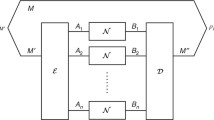Abstract
In this chapter we investigate the tradeoff between channel estimation and channel diversity for channels with memory. Block memory channels are analytically tractable yet provide practical models for many communication systems. We show that for finite block length transmission techniques there is a fundamental tradeoff between the channel estimator and the channel diversity. When the channel is operating at rates much below capacity, smaller channel memory is better since channel estimation is not crucial. This is because the code contains more than adequate redundancy to compensate for mismatch due to the potentially poor channel estimate as well as channel errors. However, at rates close to capacity, channel state information is crucial for successful decoding and therefore longer channel memory, which allows better estimates, is better. We draw these conclusions based on analysis of some simple discrete-input, discrete-output channels using the channel reliability function and on simulation results for more realistic channels (soft output) using low-density parity check codes with a joint iterative decoder and channel estimator.
This work was supported by the the Army Research Office under grant DAAH0496-1-0377, a National Science Foundation Graduate Research Fellowship and an AFCEA fellowship.
Access this chapter
Tax calculation will be finalised at checkout
Purchases are for personal use only
Preview
Unable to display preview. Download preview PDF.
Similar content being viewed by others
References
R. G. Gallager, Information Theory and Reliable Communication, John Wiley Sons, New York, 1968.
R. J. McEliece and W. E. Stark, “Channels with block interference,” IEEE Transactions on Information Theory, vol. IT-30, no. 1, pp. 44–53, Jan. 1984.
A. P. Worthen, Codes and Iterative Receivers for Wireless Communication Systems,Ph.D. thesis, University of Michigan, Ann Arbor, MI, May 2001. (Also Communication and Signal Processing Laboratory Technical Report TR-327).
E. Uysal, “Slow frequency and time hopping in wireless communications,” M.S. thesis, Massachusetts Institute of Technology, Cambridge, MA, 1999.
A. P. Worthen and W. E. Stark, “Unified design of iterative receivers using factor graphs,” IEEE Transactions on Information Theory, vol. 47, no. 2, pp. 843–849, Feb. 2001.
W. K. M. Ahmed and P. J. McLane, “Random coding error exponents for flat fading channels with realistic channel estimation,” IEEE Journal on Selected Areas in Communications, vol. 18, no. 3, pp. 369–379, Mar. 2000.
T. L. Marzetta and B. M. Hochwald, “Multiple-antenna communications when nobody knows the Rayleigh fading coefficients,” in Proceedings of the 35 t h Allerton Conference on Communication, Control, and Computing, Sept. 1997, pp. 1033–1042.
A. P. Worthen and W. E. Stark, “On iterative receivers for non-coherent channels,” in Proceedings of the 2000 International Symposium on Information Theory and Its Applications ISITA ‘00, Honolulu, HI, Nov. 2000.
Author information
Authors and Affiliations
Editor information
Editors and Affiliations
Rights and permissions
Copyright information
© 2002 Springer Science+Business Media New York
About this chapter
Cite this chapter
Worthen, A.P., Stark, W.E. (2002). On the Channel Memory-Diversity Tradeoff in Communication Systems. In: Blaum, M., Farrell, P.G., van Tilborg, H.C.A. (eds) Information, Coding and Mathematics. The Springer International Series in Engineering and Computer Science, vol 687. Springer, Boston, MA. https://doi.org/10.1007/978-1-4757-3585-7_14
Download citation
DOI: https://doi.org/10.1007/978-1-4757-3585-7_14
Publisher Name: Springer, Boston, MA
Print ISBN: 978-1-4419-5289-9
Online ISBN: 978-1-4757-3585-7
eBook Packages: Springer Book Archive




